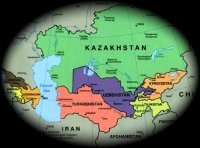
Growth is expected to remain “fairly robust,” but policymakers are encouraged to be mindful of inflation risks and take advantage of the strong recovery to prepare for any downside risks that might materialize.
Energy Exporters v. Importers:
According to the Regional Economic Outlook for the Middle East and Central Asia, released October 26, 2011 the CCA (Central Asia & Caucasus) is projected to grow 5.6 percent in 2011 and 6.2 percent in 2012. For the region’s oil- and gas-exporting countries, the expansion is driven by high oil and gas prices, while the oil- and gas-importing countries are benefiting from the continued recovery in Russia, a key trading partner. Similar dynamics exist in Middle East and North Africa – READ:
diplomaticallyincorrect.org/films/blog_post/economic-outlook-middle-eastnorth-africa-fall-2011-imf-money-flash-by-ambassador-mo/38394
Risk of Global Downturn:
External risks to the outlook in the CCA region though have increased and derive from a heightened perception of fragility in the global recovery “For the CCA, a sharp decline in global growth could mean a fall in commodity prices, a decline in export demand, and a decrease in remittances and capital flows to the region,” according to David Owen, Deputy Director of the IMF’s Middle East and Central Asia Department. “If these external risks do not materialize, however, we foresee good prospects for the region, with fairly solid growth.”
Oil and gas importers need to address external vulnerabilities. The growth outlook for region’s oil- and gas-importing countries, Armenia, Georgia, the Kyrgyz Republic and Tajikistan,,is favorable. Activity has picked up strongly in 2011, reflecting a recovery from last year’s fall in agricultural production in Armenia and a rebound from the Kyrgyz Republic’s contraction resulting from civil unrest. Continued global recovery, including in Russia, is also benefiting the region by boosting both trade and remittances. The IMF forecasts growth at an average of 5.3 percent in 2012 for the oil and gas importers.
Inflation Risks:
Driven largely by high food prices, inflation has been rising since mid-2010. In response to surging inflation, governments throughout the region have tightened monetary policy, but additional tightening is still needed in some countries, such as the Kyrgyz Republic and Tajikistan, the IMF suggests.
Fiscal Consolidation – Begun in Armenia & Georgia:
With the recovery gaining speed, CCA oil and gas importers should aim for fiscal consolidation to rebuild fiscal buffers that were depleted during the global financial crisis, to help safeguard their economies against future shocks. Such fiscal adjustment, which has already begun in Armenia and Georgia, would also help rein in large external current account deficits, the IMF report states. Maintaining exchange rate flexibility and accelerating the pace of structural reforms to boost competitiveness will also help reduce external vulnerabilities.
Azerbaijan, Kazakhstan, Turkmenistan & Uzbekhistan:
The oil and gas exporters, Azerbaijan, Kazakhstan, Turkmenistan, and Uzbekistan, are growing fast. This growth, coupled with an accommodative policy stance, poses a risk of overheating. Although international food and fuel prices are moderating, core inflation is projected to rise in 2012 in all of the CCA oil and gas exporters.
Given this risk, monetary policy should exit from its accommodative stance, the IMF report recommends. However, monetary policy has only limited traction in most of the region’s countries, so policymakers should aim to enhance its “effectiveness by fostering financial deepening, enhancing central bank independence, improving the capacity of monetary policy tools, promoting more competition in banking systems, and avoiding unnecessary government intervention.”
Keeping Fiscal Expenditures in Check:
For 2011, all of the region’s oil and gas exporters are maintaining an expansionary fiscal stance. To limit inflationary pressures and ensure stability, however, governments need to exercise caution over spending increases, cut non-priority spending, and avoid further increases in hard-to-reverse items, such as wages and pensions, the report observes. Over the medium term, measures to enhance the transparency, quality, and efficiency of public spending, as well as to raise non-hydrocarbon revenues, would also contribute to fiscal consolidation. “If, however, global growth deteriorates sharply, then tightening of macroeconomic policy might have to be put on hold,” the Report notes. Think though IMF has been too inclined toward tightening, and has been underestimating risks of slowdown and particularly continued underemployment.
Jobs & Unemployment:
The reliability of unemployment estimates in the CCA is uncertain, but available data suggest that unemployment is high.In Azerbaijan, the unemployment rate is near 10 percent, and in Armenia, it stood at 19 percent in 2009. Georgia’s unemployment rate in 2009 was about 17 percent, according to official estimates, but alternative estimates put unemployment in the range of 20–30 percent. In all countries, youth unemployment is even higher. READ most recent Report from ILO – International Labor Organization and our ARTICLE: “More Jobs Needed or Globe Could Sink into Recession & Social Unrest” -
diplomaticallyincorrect.org/films/blog_post/more-jobs-needed-or-globe-could-sink-into-recession-social-crisis-un-report-money-flash-by-ambassador-mo/39100
Creating jobs and fostering high and inclusive growth is therefore a priority for governments in the region. The key components of the medium-term reform agenda to address this challenge include “policies that aim to improve the business environment; ensure equal access to public services; enhance transparency, governance and institutional quality; boost regional trade integration; and address skill mismatches between job-seekers and available jobs.”
FILM REPORT (Spring 2011) – “Caucasus & Central Asia-Strong Growth” -
diplomaticallyincorrect.org/films/movie/caucasuscentral-asia-strong-growth/26623
By Ambassador Muhamed Sacirbey
Facebook-Become a Fan at “Diplomatically Incorrect”
Twitter-Follow us at DiplomaticallyX
“International Financial Crisis” Channel -
diplomaticallyincorrect.org/c/international-financial-crisis

